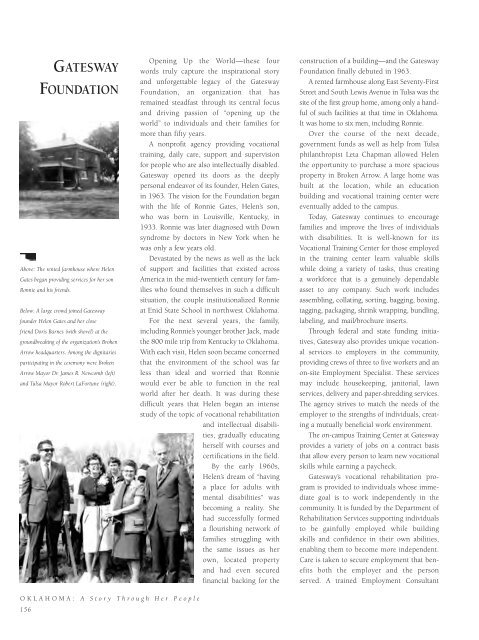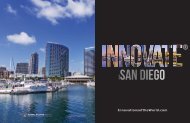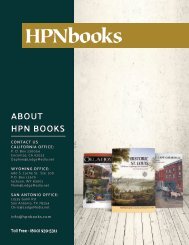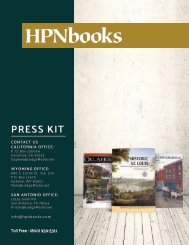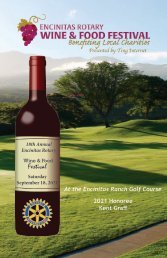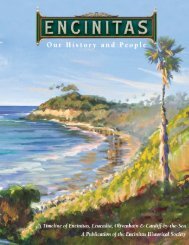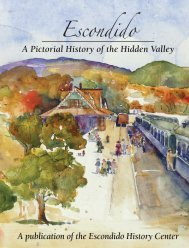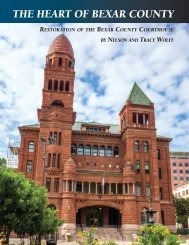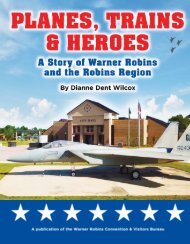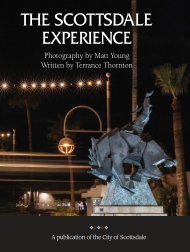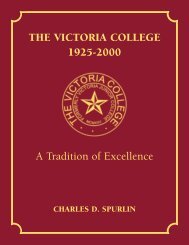Oklahoma: A Story Through Her People
A full-color photography book showcasing Oklahoma paired with the histories of companies, institutions, and organizations that have made the state great.
A full-color photography book showcasing Oklahoma paired with the histories of companies, institutions, and organizations that have made the state great.
Create successful ePaper yourself
Turn your PDF publications into a flip-book with our unique Google optimized e-Paper software.
GATESWAY<br />
FOUNDATION<br />
Above: The rented farmhouse where Helen<br />
Gates began providing services for her son<br />
Ronnie and his friends.<br />
Below: A large crowd joined Gatesway<br />
founder Helen Gates and her close<br />
friend Doris Barnes (with shovel) at the<br />
groundbreaking of the organization’s Broken<br />
Arrow headquarters. Among the dignitaries<br />
participating in the ceremony were Broken<br />
Arrow Mayor Dr. James R. Newcomb (left)<br />
and Tulsa Mayor Robert LaFortune (right).<br />
Opening Up the World—these four<br />
words truly capture the inspirational story<br />
and unforgettable legacy of the Gatesway<br />
Foundation, an organization that has<br />
remained steadfast through its central focus<br />
and driving passion of “opening up the<br />
world” to individuals and their families for<br />
more than fifty years.<br />
A nonprofit agency providing vocational<br />
training, daily care, support and supervision<br />
for people who are also intellectually disabled.<br />
Gatesway opened its doors as the deeply<br />
personal endeavor of its founder, Helen Gates,<br />
in 1963. The vision for the Foundation began<br />
with the life of Ronnie Gates, Helen’s son,<br />
who was born in Louisville, Kentucky, in<br />
1933. Ronnie was later diagnosed with Down<br />
syndrome by doctors in New York when he<br />
was only a few years old.<br />
Devastated by the news as well as the lack<br />
of support and facilities that existed across<br />
America in the mid-twentieth century for families<br />
who found themselves in such a difficult<br />
situation, the couple institutionalized Ronnie<br />
at Enid State School in northwest <strong>Oklahoma</strong>.<br />
For the next several years, the family,<br />
including Ronnie’s younger brother Jack, made<br />
the 800 mile trip from Kentucky to <strong>Oklahoma</strong>.<br />
With each visit, Helen soon became concerned<br />
that the environment of the school was far<br />
less than ideal and worried that Ronnie<br />
would ever be able to function in the real<br />
world after her death. It was during these<br />
difficult years that Helen began an intense<br />
study of the topic of vocational rehabilitation<br />
and intellectual disabilities,<br />
gradually educating<br />
herself with courses and<br />
certifications in the field.<br />
By the early 1960s,<br />
Helen’s dream of “having<br />
a place for adults with<br />
mental disabilities” was<br />
becoming a reality. She<br />
had successfully formed<br />
a flourishing network of<br />
families struggling with<br />
the same issues as her<br />
own, located property<br />
and had even secured<br />
financial backing for the<br />
construction of a building—and the Gatesway<br />
Foundation finally debuted in 1963.<br />
A rented farmhouse along East Seventy-First<br />
Street and South Lewis Avenue in Tulsa was the<br />
site of the first group home, among only a handful<br />
of such facilities at that time in <strong>Oklahoma</strong>.<br />
It was home to six men, including Ronnie.<br />
Over the course of the next decade,<br />
government funds as well as help from Tulsa<br />
philanthropist Leta Chapman allowed Helen<br />
the opportunity to purchase a more spacious<br />
property in Broken Arrow. A large home was<br />
built at the location, while an education<br />
building and vocational training center were<br />
eventually added to the campus.<br />
Today, Gatesway continues to encourage<br />
families and improve the lives of individuals<br />
with disabilities. It is well-known for its<br />
Vocational Training Center for those employed<br />
in the training center learn valuable skills<br />
while doing a variety of tasks, thus creating<br />
a workforce that is a genuinely dependable<br />
asset to any company. Such work includes<br />
assembling, collating, sorting, bagging, boxing,<br />
tagging, packaging, shrink wrapping, bundling,<br />
labeling, and mail/brochure inserts.<br />
<strong>Through</strong> federal and state funding initiatives,<br />
Gatesway also provides unique vocational<br />
services to employers in the community,<br />
providing crews of three to five workers and an<br />
on-site Employment Specialist. These services<br />
may include housekeeping, janitorial, lawn<br />
services, delivery and paper-shredding services.<br />
The agency strives to match the needs of the<br />
employer to the strengths of individuals, creating<br />
a mutually beneficial work environment.<br />
The on-campus Training Center at Gatesway<br />
provides a variety of jobs on a contract basis<br />
that allow every person to learn new vocational<br />
skills while earning a paycheck.<br />
Gatesway’s vocational rehabilitation program<br />
is provided to individuals whose immediate<br />
goal is to work independently in the<br />
community. It is funded by the Department of<br />
Rehabilitation Services supporting individuals<br />
to be gainfully employed while building<br />
skills and confidence in their own abilities,<br />
enabling them to become more independent.<br />
Care is taken to secure employment that benefits<br />
both the employer and the person<br />
served. A trained Employment Consultant<br />
O K L A H O M A : A S t o r y T h r o u g h H e r P e o p l e<br />
156


